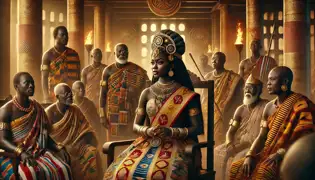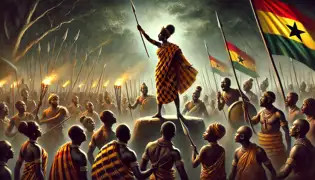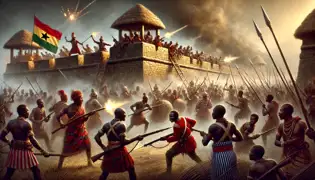Yaa Asantewaa’s Battle Cry
Reading Time: 5 min

About Story: Yaa Asantewaa’s Battle Cry is a Historical Fiction from ghana set in the 19th Century. This Dramatic tale explores themes of Courage and is suitable for All Ages. It offers Historical insights. The Queen Mother who stood against an empire and became a legend.
The Ashanti Kingdom stood at the edge of a blade. The British, relentless in their colonial expansion, had already exiled King Prempeh I, believing that with him gone, the Ashanti spirit would break. But they had underestimated the people of this proud kingdom.
Now, they wanted more—they wanted the Golden Stool, the sacred symbol of Ashanti sovereignty and unity. To the British, it was just a royal seat. To the Ashanti, it was the very soul of their people, a relic that held the spirits of their ancestors.
And when no man in the Ashanti court dared to answer the British demand, a voice rose above the silence. It was not a king or a warrior but a woman—Yaa Asantewaa, Queen Mother of Ejisu.
She was a mother, a grandmother, a leader. But when her people needed her most, she became something more. She became a warrior.
This is the story of how one woman’s courage changed the fate of a nation. Kumasi was boiling under the midday sun. Inside the royal court, the air was heavier still, thick with uncertainty and shame. The Ashanti chiefs, once proud men who had led warriors into battle, sat in uneasy silence. The British had gathered them, and at the center of the room stood Governor Sir Frederick Hodgson, his uniform crisp, his tone authoritative. *"We demand the Golden Stool,"* he declared. *"Queen Victoria is your ruler now, and she must sit upon it."* Gasps rippled through the court. The chiefs exchanged uneasy glances. No Ashanti king had ever sat on the Golden Stool—it belonged to the spirits of their ancestors. How could they hand it over to foreigners? But fear gripped them. They had seen what happened to King Prempeh I. They knew the British had superior weapons, trained soldiers, and an empire that stretched across continents. No one spoke. No one dared. And then, the sound of gold bangles clinking filled the room as Yaa Asantewaa stood up. Her face was unreadable, but her voice carried the weight of generations. *"I have seen the bravest of Ashanti warriors fight and die for our land,"* she said, her tone steady. *"I have seen the blood of our fathers and brothers spilled so that our people may be free. And now, you, the men of Ashanti, sit here and tremble before these white men? Are you not ashamed?"* The room was silent. Some chiefs lowered their heads. *"If you, the men of Ashanti, will not fight, then we, the women, shall rise!"* she declared, her voice shaking the very walls of the court. And just like that, the war began. Yaa Asantewaa did not wait for the chiefs to find their courage. That night, she gathered the women of Ejisu and beyond. They came armed with cutlasses, bows, muskets, and the unbreakable will of warriors. *"We will not sit idle while the British desecrate our land,"* she told them. *"We will fight, as our ancestors did before us."* Word spread quickly. Men, ashamed by their earlier cowardice, began to rally behind her. Within weeks, thousands of warriors were ready. The Ashanti people had always been masters of the land, and Yaa Asantewaa planned to use this to their advantage. The British fought in open fields, relying on their rifles and cannons. But the Ashanti would fight in the forests, where the trees would be their shields and the rivers their allies. The first battle came swiftly. Yaa Asantewaa and her warriors surrounded the British fort in Kumasi, trapping the enemy inside. For months, the British soldiers suffered. Supplies ran low. Disease spread. And each night, the Ashanti warriors struck—silent arrows from the shadows, swift attacks from unseen enemies. Even British reinforcements found it difficult to break through. The roads were blocked, bridges destroyed, and spies lurked everywhere. For the first time, the British feared they might lose. But Yaa Asantewaa knew they would not give up so easily. The enemy had resources, ships, and endless reinforcements. If the Ashanti were to win, they would have to strike a final, decisive blow. She planned a full-scale attack on Kumasi, one that would drive the British out once and for all. As the Ashanti prepared their final assault, betrayal struck. A local informant, tempted by British gold, revealed the hidden location of Yaa Asantewaa’s stronghold. The British acted swiftly. Under the cover of night, they launched a surprise raid. Muskets fired, the scent of gunpowder filled the air, and Ashanti warriors fought bravely. But the British outnumbered them, and Yaa Asantewaa was taken. Bound in heavy chains, she was paraded through Kumasi. The British had won the battle—but they had not won the war. Even as she stood before the British governor, bruised but unbroken, she did not beg. *"You may take my body,"* she told them, *"but you will never take the spirit of my people."* With those words, she was exiled to the Seychelles, where she would spend the rest of her days. Yaa Asantewaa never returned to Ghana. She died in exile in 1921, far from the land she had fought so fiercely to protect. But her spirit never left. Though the British claimed victory, they could never truly control the Ashanti. The fire that Yaa Asantewaa ignited continued to burn, passed down through generations. Years later, in 1957, Ghana became the first African nation to gain independence from colonial rule. And today, her name lives on in every Ghanaian who fights for justice, in every woman who dares to lead, in every battle cry that rises against oppression. Because Yaa Asantewaa did not just fight for her people—she fought for the future. Her words still echo: *"If you, the men, will not fight, then we, the women, shall rise!"* And rise, they did.The Meeting of Cowards
Preparing for War

The Siege of Kumasi Fort

The Betrayal

The Legacy of a Warrior Queen


















